- Home
- Mary Anne Kelly
Jenny Rose Page 4
Jenny Rose Read online
Page 4
Shannon Airport was quiet after Kennedy. There were nothing but white people. I felt immersed in my tribe. Jet-lagged to the point of delirium, but with my red-headed, white-skinned tribe. Like a Jew after a long, first-time journey to Israel, I thought. Or a black American to Mombasa. I staggered around the shops bursting with shamrocks and golf caps. That was the worst of it. Finally I found an authentic Italian cappucino stand near the duty-free and I perched myself there on a comfortable high stool, ate soda biscuits with raisins in them, the best I’d ever had, really, then I’d alternately nod off and zing upright, berserk with caffeine, until they called my flight. I wondered what I would do if I ran into Temple Fortune, for this would be the sort of place you would run into him, hopping a flight over to London, on his way to LA. I knew he lived in County Cork. I remembered every word he’d ever said to me, casual or impertinent. I haven’t talked about Temple Fortune. It was one of those things that’d taken so long to stop monopolizing my life even though he had nothing to do with it, that I just didn’t even want to take it out and unfold its musky attic scent for fear of feeling pain like that again. Or loss. It was more like loss than pain. And more like sex than no sex. Even though we’d never had any.
It had happened, or, in this case, not happened, in Munich five years ago. The kids were small and I was thrilled to be away from them for the first time, working. I used to see myself as quite the dashing character when I was young and here I’d been feeling that way again, though I’d been perfectly happy as a retired mom, happy in my long skirts and touch of lipstick, hanging out at the grammar school, tying shoelaces at lunch duty, running to the supermarket or the more exotic 101st Avenue for homemade linguini and oozing mozzarella. At least I think I was happy. But then in Munich, there he was. And I’d never gotten over him. When I met him, those five years ago, he’d filled me with the most incredible longing and heat. I’m not inordinately wild about men. I mean, I’ve had my share and I particularly enjoyed my husband’s body when we first hooked up, but Temple Fortune, when he came into my life, had me writhing through the most encompassing lust and ardor I’d ever felt. If he would so much as stand near me, I’d get filled with such a sexual yearning I’d go to my bed and rock myself back and forth. I didn’t enjoy this. It was so strong, though. So overpowering. If he’d been the slightest bit forceful, he could have had me. But he’d left it up to me. And the kids were so young. I’d never felt important enough to destroy an entire family for a good roll in the hay. For that’s what it would have been. He’d put it to me. He’d said I was just out to use him. I didn’t want to marry him. Just get him to fall in love with me and then I’d go back to my family. He was right. What I’d wanted was exactly, I suppose, what I just knew Johnny was having now. A steaming, clandestine, illicit affair. Except mine hadn’t happened. I’d had my righteousness to keep me warm. And we know what the Bible says about righteousness. It’s like a bunch of old rags. What I hadn’t counted on, and how could I have known, was that I’d spend almost three years trying not to think of him.
Then I read in my Uptown dentist’s Eastern philosophy magazine, if you want to lose something, you’ve got to concentrate on it totally so it can have its day and then go. So I let myself concentrate on him, his face, the memory of his wrists, his voice. Eventually, it worked. Entire days went by without the yearning. Then, slowly, weeks. I’d just about gotten to what myself and I laughingly referred to as my golden trimester of non-thought, when all this happened. Okay, except for the portable sex bit but I mean for heaven’s sake, you’ve got to have something.
I wondered if he lived in southern Ireland anymore anyway. Most likely he’d moved back to LA. You’re probably thinking no wonder her husband took himself off to another woman. You’re probably right.
The hop to Cork was nothing and my luggage was waiting for me when I got to the carousel. I found the counter for my rental car and almost couldn’t breathe when the girl announced all she had left was a stick shift. “And how much will it cost, ballpark, for, say, two days?” I asked her. “Two hundred something pounds,” she told me. “Huh,” I said. I hadn’t had to drive a stick since a thousand years ago in India. “You’re awfully lucky to get it,” the good-with-people Irish lassie in plaid confided. “There isn’t another working car to be had from here to Skibbereen.”
Misinterpreting my horror for displeasure, she chirped, “Come on, let’s go have a look at it. It’s really cute. You’ll love it.”
I didn’t dare let on for fear she’d take it back and I’d be relegated to the bus.
“Can you tell me anything about Skibbereen?” I asked her as we made our way out to the open car park, me lugging my big bag on my shoulder, my camera bag around my neck like a horse harness. The sky was so big in every direction. It was all over the place. A group of Belgian kids straggled past us and joined the line for the bus into town. They had their backpacks and hemp-woven shirts.
“Well,” my girl said, steering me through the bumpers of rows of cars, “it’s a lively market town, isn’t it? Cows and pigs. I take it there’s quite a large arts and crafts community for such a small town. Only about three thousand.”
“What’s that smell?” I asked, trying to keep up with her. It was strong and pungent and unusual. Like farm fodder.
“What smell?”
I looked back at the troop of kids waiting there for the bus. They all looked so healthy and free.
“This is it,” she said, standing in front of an uninteresting-looking white car.
I imagined myself throwing my gear in the “boot” and fiddling with my mascara until she’d left the lot. When she would be out of earshot, I’d buck my way out of the parking area.
“You know what?” I said. “I’ll take the bus.” I gave her some sort of a lurching salute and strode away, feeling absurdly wonderful. The bus was just finished loading its passengers and I climbed aboard, plunked my measly three pounds over to the driver, sat beside a stringy woman in a starched and ironed lilac dress with a handmade lace collar and listened to her all the way to Skibbereen. She told me all about her misshapen broken foot that had mended so badly almost thirty years ago when her sister’d pushed her down the cellar stairs and then she held it out, twice, for me to admire. Oh, she told me lots of things. Where to go down the lane to Nancy’s slim-making class. And last but not least she pointed out the house of the lady where you could make a triduum to St. Jude the Impossible.
I was so relieved to be on the bus, not having to worry about driving on the left side, not worrying about maps and “petrol.”
There were horses in stone-fenced fields and tidy cement houses with flowers on sills. It wasn’t at all the way I’d thought it would be. Every window shone and wore white curtains. Was all of Ireland so clean? I’d imagined it more poor. The sky was filled with dashing clouds. I promised myself I wouldn’t go on about the bonny green hills but, forgive me, it was my first time there and it was such a green green. Before I became used to road signs in Gaelic and snatches of scenes from long ago, the road closed to a path in steep velvety moss on either side. Startled pheasant shot out in front of me. I thought of my mother’s un-American fruit and pheasant pie and I figured we must be getting close.
The center of town was a broad curved street, long and aplenty with doors. I suppose if I’d come in on another day, it would have been drizzly and unimpressive. But I didn’t. And it wasn’t.
It’s not a terribly big town. We’d driven through the two main streets, Bridge Street and Front Street, before I’d had a proper look around. There was a bicycle shop and a bridge over the River Ilen, which divided the town. My first impression was a group of laughing young people in front of a big fountain. Then folk with white hair standing about before a chartreuse store that sold tea and biscuits made in Cork. The lady with the broken foot instructed me to stay on the bus because it was the Toehead side I would be wanting, toward Castletown. I could call ahead from Dayday’s, she told me. She knew where I was going if I
didn’t.
The road veered and I got my first glimpse of a dazzling sea. The wooden post along the side of the road read Skibbereen, and I thought, This? This my mother left for Queens? Larks swept above my head and a red boat rocked in the harbor. The bus maneuvered a narrow bend and the little road curved. A man marched across what I took to be the marsh. There was a house alone up on the bracken. A chill, tall house but in a handy spot, with three roads crossing by it. It was painted shell pink. “Dayday’s” it said on the coal scuttle filled with blooming succulents.
“This’ll be it.” The driver pulled to the side and opened the door. I said goodbye to the lady of the broken foot and bumped down the steps. The doors closed and the bus fumed and sped away.
It was a funny feeling. Horizon all around. I called to the young man walking there and getting ever farther away. He turned and strode over amiably, long-limbed with stovepipe pants and a dark gray fisherman’s sweater despite the heat. He had a long, white face with freckles and a couple of red pimples and frank, open eyes.
“I’m looking for the family Cashin,” I called. “Do you happen to know which way?”
Without answering, he pointed down the road I was headed.
“Thanks,” I said, hoisting my bag to my shoulder. “How much farther, would you say?”
“N-not far,” he said, ducking under his brown curls.
“I can go in here?” I looked at the sign again. “Dayday’s?”
“We-we-well, it’s Dayday’s but you’re best to call her M-m-m-Mrs. Driver.”
“Oh, thanks. I’d like to call ahead,” I explained needlessly as I walked toward the building, but he was such a nice fellow I didn’t want to hurt his feelings and let him think I didn’t trust his directions. Mostly because he’d stuttered. Dharma had stuttered on and off for a while when she was little. You never forget the meanness of children toward someone you love. I waved as he walked away and he waved back.
I shook my hair free of its elastic. The fresh wind blew and combed away the smell of the plane as I made my way up the path to the door. I hammered with the clapper but nobody answered so I just went in. The door creaked and I couldn’t see clearly for a moment. A rack of fresh bread greeted you. The place was dark and disorderly, with a glum-looking group of people there in a huddle, all leaning on a wooden bar. A woman polished glasses behind the bar. A dog leaned over and stretched and I almost cried out when I saw it wasn’t a dog at all but in fact a cat. The biggest house cat I’d ever seen in my life. Its yellow eyes watched me back away. My unnerving seemed to please the house. There was no laughter, just the muffled titter, but I had the newcomer’s awareness of being the butt of a joke. “Hello. Do you have a phone?” I asked the little woman behind the bar.
“I do,” she said. We looked at each other.
“Well, is it for the general public or are you keeping it warm for the landed gentry?” I inquired politely but in the straight-backed way of my mother. Without any discernible difference in her expression, but a distinct twinkle in her eye, she showed me through to another unkempt room (she reached just up to my chin) and then she left me there. I found my aunt’s number in my wallet of growing papers and put the 20p in the slot.
“Hello,” I said when someone picked up. “This is Claire Breslinski. Mary’s daughter … I’m here in Skibbereen—”
“Claire?” a man’s sluggish voice cut in. “I thought Zenobia was coming.”
“Yes, she was,” I said, feeling foolish, “but something happened at work and she couldn’t leave.”
“But she was the policeman,” he said again, clearly disappointed.
“I’m sorry,” I said, at a loss how to continue.
There was the sound of a scuffle and someone else got hold of the phone. “Hello?” a woman’s crisp voice said. “Hello, this is Bernadette Mulderrig. Who is this, please?”
“Hi. It’s Claire Benedetto,” I began again, using my married name for this authoritative female. “Mary’s daughter from America? I know Zinnie was supposed to come but you see—”
“Ah, yes,” she broke in. “Hello, hello. Are you at the airport?”
“No, I’m just outside Skibbereen. On the Toehead side. I think I’m very near.”
“Oh, you are. You’re here. That’s fine. Are you at Dayday’s then?”
“Yes, I am.” I imagined I could hear the sea through the phone.
“Let’s see, then. You’ll never find it. Nothing’s marked. I’ll send my brother, Liam, out. He’ll be your cousin. Have you a car or a taxi?”
“I’ve taken the bus.”
“Oh! I see. Just stay there, now. It won’t take but a short while. Don’t go ordering any breakfast in that place,” she instructed, my stock gone down. “And whatever you do, don’t go sit in the chair.” She hung up.
So she would be my cousin Bernadette, I thought as I replaced the big old-fashioned receiver onto its cradle, feeling safe. When I was a little girl I’d tried writing this family, I remembered now. My pen-pals in Ireland, I’d thought they’d be. They’d had the charm of being foreign. They hadn’t answered, though. They were “off on another track” my mother had gently explained, and I remembered imagining Bernadette as a sort of train. From the way she spoke, I hadn’t been far wrong.
I went back into the main room and ordered a mineral water.
“We’ve none of that.” Mrs. Driver frowned disapprovingly. “Will you have tea?”
“I’d love it,” I said, off on the wrong foot, “but I’m afraid I haven’t time.”
“Ah, yes. American, are we?”
“Yes,” I said, too tired and proud to excuse myself.
She stood there with her hands folded in front, peering up at me from bobbing curls with small monkey eyes. Taking me in. Not offensively, just summing me up. She wore a Navaho print vest. You could see better now. The room had a kind of orangey warmth. There was a lot of stuff crammed about. Odd stuff, like at a garage sale. On the walls, however, hung paintings of the county. Lovely paintings of the town and its doors, the harbor and the pretty boats. They were filled with space and rich, jewel-like colors. There was one painting of two fish on stones, sunlit, wet, rainbow colors. It was so compelling, I walked over to it and touched it. “I know,” Mrs. Driver said. “You’d think they were really dead, wouldn’t you?”
I looked at her.
“Well, you couldn’t say they looked alive.”
The door swung open and there stood a fellow framed in sunlight, keys in hand. He was clearly not coming in by the way he stayed out on the step, I knew he was here for me. “Zinnie?” he said.
“Liam?”
“Thank you for the phone,” I said to Mrs. Driver. “Next time for the tea.”
“Mind you don’t miss the donkey while you’re out that way,” she said.
“That’s a lovely donkey, they’ve got,” the fellow beside her said.
“He’s a brown one, now. Down in Bantry there’s a reddish one.”
“Is that right?” the other fellow said.
I took hold of my bag and followed Liam into the wind.
“Zinnie couldn’t come. I’m sorry. Sorry no one let you know. I am your cousin, though. Just the other one.”
“It’s all right,” he said. “Any cousin from America will do.”
“It’s Claire,” I said. “Claire Breslinski.”
“Claire?” He scrutinized me. “The photographer?”
“What’s left of her.”
“Oh, good.” He heaved my bag away from me and we made our way over the spongy path to his car. We had the same tromping Viking rhythm, long legs, thick arms, the same heavy, once-bright-red hair. Our faded places where freckles had been had correlating genetic tracks across our identical noses. We liked each other right away.
“You look more like me than my own sister does,” he remarked.
Fast drops of rain plunked onto us. We had to duck into the car, me thinking I was hopping into the passenger seat and then faced with the s
teering wheel.
“Do you mind?” he said, tossing me the keys.
“Not if you don’t value your car,” I said, catching them.
“Who cares?” he said. “It’s Bernadette’s.” He relaxed and lit a cigarette, his white fingers with red woolly hairs on them tapping the strong tobacco in good. I pulled away and we chugged down the salty peninsula. Gulls swept up and then down out of sight beneath the steep cliffs. There weren’t many houses at all this way, just now and then you could make out a turn-off.
“Tell me about Jenny Rose,” I said when the car seemed to be moving along with hardly a lurch. I didn’t want him to think I’d just found out about her. At the same time I didn’t like being thought of as having neglected her all these years. Not being lumped in the latter atrocity seemed worse so I told him, “You know, the first I heard of Jenny Rose was yesterday.”
“Is that so,” he said, obviously not believing a word of it.
“Yes, as a matter of fact it is.” I let my own indignation show in the edge of my voice. We rode along in impressive silence. Finally, I said, “Would you like to tell me something about her?”
“What’s to tell?” He shrugged. “She needs a bath.”
Needs a bath? I thought. Who’s been raising this child?
He shook his head disgustedly. “She thinks she needn’t get up and live life like the rest of us mortals, y’see. Oh, no. Not Jenny Rose. She needn’t come and breakfast with the world. She’ll go straight from her dreams to the canvas and the rest of the world can be damned. No matter what needs doin’, see. She thinks—”
“What, she paints?”
“Yes, well that’s it. That’s all she ever does do,” he practically shouted. “Or fish,” he muttered. “She’s a fine one for bringing fresh fish home, I’ll give her that.”
“You don’t like her?”
“Like her? Funny question. She’s family. Anyway, Jenny Rose doesn’t want to be liked. She wants to be respected.”
“That’s not her stuff hanging on the wall in Dayday’s, is it?”

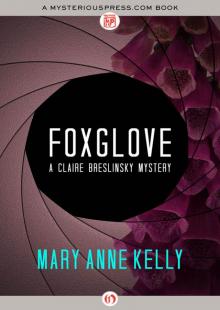 Foxglove
Foxglove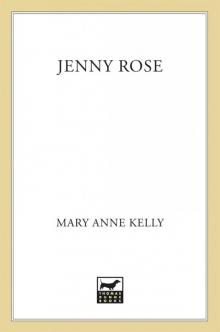 Jenny Rose
Jenny Rose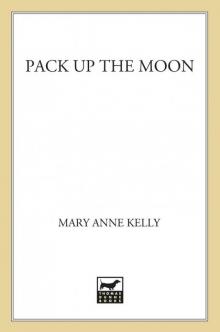 Pack Up the Moon
Pack Up the Moon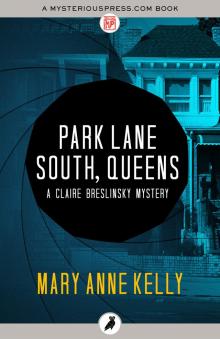 Park Lane South, Queens
Park Lane South, Queens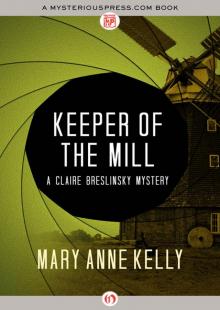 Keeper of the Mill
Keeper of the Mill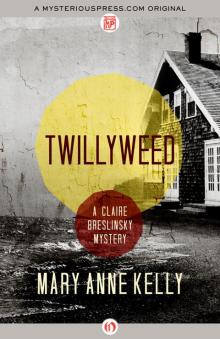 Twillyweed
Twillyweed